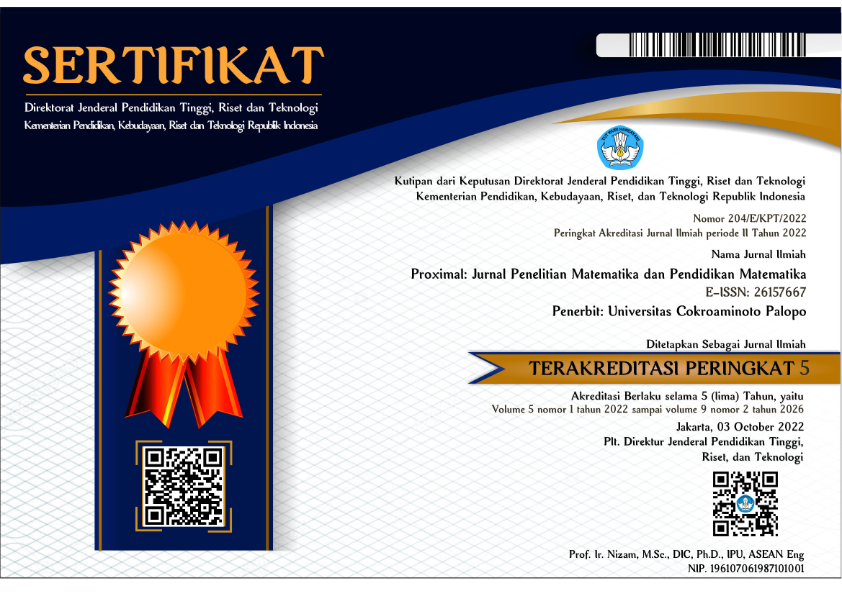Penelitian Pengaruh Model Pembelajaran Kooperatif Tipe Diskursus Multy Reprecentary (DMR) Terhadap Kemampuan Komunikasi Matematis Siswa Kelas VII SMP Negeri 3 Ampek Angkek
DOI:
https://doi.org/10.30605/proximal.v8i4.7114Keywords:
Model Diskursus Multy Reprecentary, Kemampuan Komunikasi MatematisAbstract
Penelitian ini dilatarbelakangi oleh rendahnya kemampuan komunikasi matematis siswa di SMP Negeri 3 Ampek Angkek yang disebabkan oleh pembelajaran yang masih berpusat pada guru. Penelitian ini bertujuan untuk mengetahui pengaruh model pembelajaran kooperatif tipe Diskursus Multy Reprecentary (DMR) terhadap kemampuan komunikasi matematis siswa kelas VII. Jenis penelitian ini adalah pra-eksperimen dengan rancangan The Static Group Comparison Design. Sampel penelitian terdiri atas siswa kelas VII. 3 sebagai kelas eksperimen dan VII. 1 sebagai kelas kontrol. Instrumen penelitian berupa tes uraian kemampuan komunikasi matematis yang telah divalidasi. Data dianalisis menggunakan uji-t dengan bantuan perangkat lunak Minitab pada taraf signifikan 0,05. Hasil penelitian menunjukkan bahwa terdapat perbedaan yang signifikan antara kemampuan komunikasi matematis siswa yang diajar dengan model DMR dan pembelajaran konvensional (t-hitung = 5,14 > t-tabel = 1,67 : p < 0,05). Dengan demikian, model pembelajaran kooperatif tipe DMR berpengaruh signifikan terhadap kemampuan komunikasi matematis siswa. Model ini direkomendasikan sebagai alternatif pembelajaran yang dapat mendorong siswa untuk mengkomunikasikan ide-ide matematis secara lebih jelas dan terstruktur.
References
Amin, dkk, 164. (2022). Model Pembelajaran Kontemporer. Bekasi : Pusat Penerbitan LPPM Universitas Islam 45 Bekasi.
Bambang Prasetyo. (2005). Metode Penelitian Kuantitatif : Teori dan Aplikasi, Jakarta : Raja Grafindo Persada.
Fadly, Wirawan. (2022). Model-Model Pembelajaran untuk Implementasi Kurikulum Merdeka. Bening Pustaka.
Isnaniah & M.Imamuddin. (2017). Komunikasi Matematis dalam Pembelajaran Berdasarkan Gender (Journal of Gender Studies.vol.1, no.2, Juli-Desember 2017 Eissn : 2580-7765).
Isnaniah & Mutia, M. (2024). Kemandirian Belajar dan Kemampuan Pemecahan Masalah Matematika Siswa Menggunakan Model Discovery Learning. (INNOVATIVE Journal Of Social Science Research Volume 4 Nomor 1 tahun 2024 Page 10665-10667.
Khudrotun Nafisah dan Hafis Mu’Abbad. (2023). Model-Model Pembelajaran Merdeka Belajar Malang : Java Cretive.
L. Virginayoga Hignasari. (2020). Menyemai Benih Dharma Perspektif Multi disiplin. Ahmar Cendekia, Hafiziani, dkk. (2020). Kemampuan-kemampuan matematis dan pengembangan instrumennya. Upi Sumedang Press.
Medika, G.H. & Putra,I.Y dkk. (2025). Analisis Kemampuan Komunikasi Matematis Siswa Kelas VIII-9 MTsN 1 Bukittinggi. (Jurnal Polinomial,Volume 4, Issue 3 (2025), pp 708-713.
Risnawita & Hikah. Y(2024). Pengaruh Model Problem Based Learning Terhadap Kemampuan Pemahaman Konsep Matematika Siswa Kelas VIII MTsN 10 Agam. (INNOVATIVE Journal Of Social Science Research, volume 4 Nomor 5 Tahun 2024 page 9343-9353).
Rusdi & Saputra,Andi. (2019). Hubungan Kemandirian Belajar Dengan Kemamapuan Komunikasi Matematis Siswa di Kelas VIII SMP Negeri 3 Tigo Nagari.(Journal of Educational Integration and Development. Vol,2.No,2.E-ISSN:2798-4176).
Shofiyah & Benny Hendriana. (2021). Analisis Kemampuan Komunikasi Matematis Peserta Didik Pada Pembelajaran Dalam Jaringan (Daring) Secara Synchronous. (Journal of Educational and Language Research. Vol.1, No.5, Desember).
Supriyadi. (2020). Evaluasi Pembelajaran. Pekalongan : PT Nasya Expanding Management.
Wahyuni. 2019. Pengaruh Model Pembelajaran Diskursus Multy Reprecentary (DMR) Ditinjau Dari Kecerdasan Majemuk Terhadap Kemampuan Komunikasi Matematis Peserta Didik. (Universitas Islam Negeri Raden Intan Lampung).
Downloads
Published
Issue
Section
License
Copyright (c) 2025 Nila Dwi Putri, Isnaniah Isnaniah, Arifmiboy Arifmiboy, Rusdi Rusdi

This work is licensed under a Creative Commons Attribution 4.0 International License.
In submitting the manuscript to the journal, the authors certify that:
- They are authorized by their co-authors to enter into these arrangements.
- The work described has not been formally published before, except in the form of an abstract or as part of a published lecture, review, thesis, or overlay journal.
- That it is not under consideration for publication elsewhere,
- That its publication has been approved by all the author(s) and by the responsible authorities – tacitly or explicitly – of the institutes where the work has been carried out.
- They secure the right to reproduce any material that has already been published or copyrighted elsewhere.
- They agree to the following license and copyright agreement.
License and Copyright Agreement
Authors who publish with this journal agree to the following terms:
- Authors retain copyright and grant the journal right of first publication with the work simultaneously licensed under Creative Commons Attribution License (CC BY 4.0) that allows others to share the work with an acknowledgment of the work's authorship and initial publication in this journal.
- Authors are able to enter into separate, additional contractual arrangements for the non-exclusive distribution of the journal's published version of the work (e.g., post it to an institutional repository or publish it in a book), with an acknowledgment of its initial publication in this journal.
- Authors are permitted and encouraged to post their work online (e.g., in institutional repositories or on their website) prior to and during the submission process, as it can lead to productive exchanges, as well as earlier and greater citation of published work.















